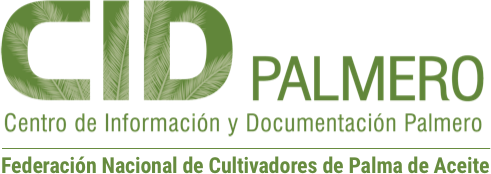| dc.creator | Guataquira, Stephany | |
| dc.creator | Mesa-Fuquen, Eloina | |
| dc.creator | Ruíz-Romero, Rodrigo | |
| dc.creator | Romero-Angulo, Hernán M. | |
| dc.date | 2019-11-15 | |
| dc.date.accessioned | 2020-07-25T11:21:43Z | |
| dc.date.available | 2020-07-25T11:21:43Z | |
| dc.identifier | https://publicaciones.fedepalma.org/index.php/palmas/article/view/12788 | |
| dc.identifier.uri | http://repositorio.fedepalma.org/handle/123456789/140816 | |
| dc.description | La polinización asistida es una labor prioritaria en el cultivo del híbrido interespecífico OxG que permite mantener su rendimiento y mejora la conformación de los racimos. El polen utilizado en esta labor proviene de la palma africana (Elaeis guineensis) y es aplicado por parte de operarios capacitados, quienes realizan esta actividad durante aproximadamente las ocho horas de una jornada laboral. Dada la importancia que tiene el polen para la polinización asistida en el cultivo del híbrido OxG, se monitoreó su capacidad de mantenerse vivo (viabilidad) y de germinar (germinabilidad) durante las 8 horas de una jornada de trabajo en campo. Para esto, el polen fue puesto a germinar in vitro en medio agar-agar en cajas Petri, las cuales fueron incubadas a 37 ºC durante 120 min. La germinación fue comprobada mediante inspección visual al microscopio. En esta evaluación, que se realizó en la zonas palmeras Suroccidental (Tumaco) y Central (Barrancabermeja) de Colombia, se observó que el porcentaje de viabilidad entre el inicio y el final de la jornada de trabajo no varió más allá de 10 %, mientras que la germinabilidad no superó el 25 % de variación entre el inicio y el final de las ocho horas de trabajo. Teniendo en cuenta este rango de variación, se recomienda evitar el uso de polen con germinabilidad inferior a 50 % y asegurar la calidad de este insumo usando polen con germinabilidad cercana o superior a 70 % para la polinización asistida del híbrido OxG. | es-ES |
| dc.description | Assisted pollination is a priority task in the cultivation of the interspecific OxG hybrid that allows to maintain its yield and improve the formation of bunches. The pollen used in this work comes from African palm (Elaeis guineensis) and it is applied by trained operators who perform this activity during approximately eight hours of a working day. Given the importance of pollen on assisted pollination in the cultivation of the OxG hybrid, the ability of this compound to stay alive (viability) and to germinate (germinability) during 8 hours of a field work day was monitored. To do this, pollen was put to germinate in vitro in agar medium in Petri dishes. The dishes were incubated at 37 ° C for 120 min and germination verified by visual inspection under a microscope. In this evaluation, carried out in the Colombian Southwestern (Tumaco) and Central oil palm zones (Barrancabermeja), it was observed that the percentage of viability between the start and the end of the working day did not vary beyond 10%, while the germinability did not exceed 25% variation between the start and end of eight hours of the work day. Taking into account this range of variation, it is recommended to avoid the use of pollen with germination below 50% and ensure the quality of this input using pollen with germination close to or greater than 70% for the assisted pollination of OxG hybrids. | en-US |
| dc.format | application/pdf | |
| dc.language | spa | |
| dc.publisher | Fedepalma | es-ES |
| dc.relation | https://publicaciones.fedepalma.org/index.php/palmas/article/view/12788/12682 | |
| dc.source | Revista Palmas; Vol. 40 Núm. 1 (2019); 13-20 | es-ES |
| dc.source | 0121-2923 | |
| dc.title | Evaluación de la viabilidad y germinabilidad del polen durante la labor de polinización asistida en campo | es-ES |
| dc.title | : Evaluation of the Feasibility and Germinability of Pollen during Assisted Pollination in Oil Palm Crops | en-US |
| dc.type | info:eu-repo/semantics/article | |
| dc.type | info:eu-repo/semantics/publishedVersion | |


